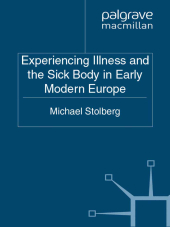 Neuerscheinungen 2011Stand: 2020-01-07 |
Schnellsuche
ISBN/Stichwort/Autor
|
Herderstraße 10
10625 Berlin
Tel.: 030 315 714 16
Fax 030 315 714 14
info@buchspektrum.de |

M. Stolberg
Experiencing Illness and the Sick Body in Early Modern Europe
1st ed. 2011. 2011. vi, 292 S. 235 mm
Verlag/Jahr: SPRINGER PALGRAVE MACMILLAN; PALGRAVE MACMILLAN UK 2011
ISBN: 1-349-31837-X (134931837X)
Neue ISBN: 978-1-349-31837-7 (9781349318377)
Preis und Lieferzeit: Bitte klicken
Based on thousands of letters written by patients and their relatives and on a wide range of other sources, this book provides the first comprehensive account of how early modern people understood, experienced and dealt with common diseases and how they dealt with them on a day-to-day basis.
Some Thoughts on Theory Sources Acknowledgements Introduction PART I: ILLNESS IN EVERYDAY LIFE The Concern for Oneself Disease and the Self The Experience of Pain The Search for Meaning: Religion, Witchcraft and Astrology The Search for Meaning: Illness, Way of Life and Biography The Narrative Reconstruction of Personal History Anxieties The Physician´s Audience: Illness and the Bedside Community Nursing Care The Medical Marketplace The Doctor-Patient Relationship PART II: PERCEPTIONS AND INTERPRETATIONS Medical Popularization From Temperament to Character Plethora and Apoplexy Fluxes, Gout and Rheumatism ´Gichter´ and Cramps Acrimonies Red Murrain (Erysipelas) Scurvy The Therapy of Acrimonies Miasms and Contagia: Plague, French Disease and English Sweat Indigestion, Winds and Slime Obstruction and Disrupted Excretion Stagnation and Deposits Cancer Pathological Heat Vapors Fever Consumption and Consumptive Fever Expenditure and Exhaustion Dropsy Seminal Economy PART III: DOMINANT DISCOURSE AND THE EXPERIENCE OF DISEASE The Sensible Body A New Disease: the Vapors Historical Roots: ´Vapores´, Hypochondria and Hysteria The Rise of the Nerves Embodiment Critique of Civilization The Sensible Woman The Cult of Sensibility Illness as Protest Conclusion: A New Bourgeois Habitus Manuscript Sources Printed Sources
´Stolberg´s compelling study demonstrates the vitality of the social history of medicine, and shows that it is possible to capture the sensations of the sick in past centuries.´ - Hannah Newton, University of Cambridge, Social History of Medicine
MICHAEL STOLBERG was trained as both an historian and a physician. He has worked in Germany, Italy and the UK and, since 2004, has been chair of History of Medicine at the University of Würzburg, Germany. He has published widely on the historical anthropology of illness and the body and on the theory and practice of learned medicine in the early modern period.
Translated from the German original by Leonhard Unglaub and Logan Kennedy


